Workshops
MODULE 1: In five workshops with different contextual and media focal points, participants will work on their own project accompanied by instructors. The participants’ projects can be realized in the direct neighborhood or the landscape around Tenna. There is also a seminar room and a library with specialist literature. At the end of the academy, the participants will present their projects to the staff and other group members.
The participants apply with their own proposal or a concept for a project. On this basis, the jury selects the participants and assigns him or her to an instructor and a workshop. The assignment of instructors and workshops can be revised at a later point if there is a good reason for it. The following options are available:
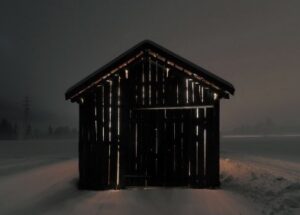 Workshop I: Local Context and Installation
Workshop I: Local Context and Installation
Mentors: Gabriela Gerber/ Lukas Bardill (CH)
The focus of this workshop is on rural space and its geographical, cultural and social characteristics. This context is a requirement for site specific interventions and is derived from scouting in the field, encounters with local people and the acquisition of knowledge of contemporary and historical conditions.
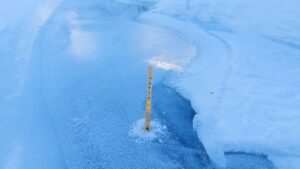 Workshop II: NatureCulture and Transmediality
Workshop II: NatureCulture and Transmediality
Mentors: Flurina Badel and Jérémie Sarbach (Badel/Sarbach), CH
Badel/Sarbach work with issues around the transformation/construction of landscape and with questions such as the relationship between nature and culture in the Anthropocene and new forms of communication. The focus of this workshop is on processual and transformative artistic work, from research to realised work. In the group the transfer of ideas and insights concerning nature-culture will be placed in the context of art and in relation to the site. Intermedial approaches will be discussed at the interface of analogue and digital worlds.
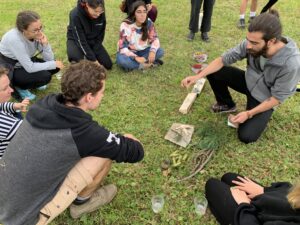 Workshop III: Eating with the Earth
Workshop III: Eating with the Earth
Mentors: Laura Bodenmann and Sascha Skraban (CH)
Eating is one of the central social activities that humans engage in every day. Food also connects people and is thus one of the oldest cultural activities. By using food as an artistic medium and means of communication, it creates multi-sensory experiences and explores interactions between people and the world of animals and plants. The workshop will discuss historical methods of food preparation and the role of food in society. The focus is on questioning the acts of cooking, staging and eating in the context of art and ecology.
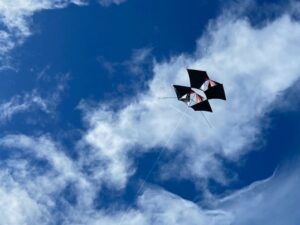 Workshop IV: Earth on air
Workshop IV: Earth on air
Mentors: Fabian Gutscher and Kaspar König (CH)
In the Safiental it is often windy. The wind whizzes turbulently down the valley or purrs lightly over the water. Kaspar König and Fabian Gutscher make the wind audible by means of flying objects. In the workshop they will work with wind and other environmental sounds. The workshop will focus on kite building, sound recording methods and the discussion of the landscape in terms of “acoustic ecologies”. For this, the artist duo offers their many years of expertise in the field of sound art and experimental product design/instrument making, which they relate to topics such as the climate crisis and sustainability.
This workshop is supported by: ZHdK, Forschungsschwerpunkt Transdisziplinarität
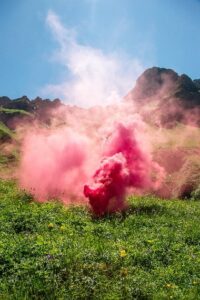 Workshop V: Theorizing Ecology
Workshop V: Theorizing Ecology
Mentorin: Hanna Hölling (CH/UK)
Two decades into the new millennium, the belief in nature-culture divide is no more sustainable. Today, we find ourselves in a network of interdependencies, in a process of an ongoing identity formation and co-habitation with other organisms. In such a world, being can only be ethical, a way of caring for each other—the biological or non-biological bodies. Here, making becomes ecological, a form of exerting and receiving agency, and a way of thinking with materials, whether formed by geological forces or human technology.
Drawing on new materialisms, agential realisms and object-oriented ontologies, this workshop will engage, in theory, with the ideas of “natureculture” (Barad, Haraway) and “reworlding” (Latour, de la Bellacasa). In practice, we will work with case examples of works addressing ecological thinking, climate crisis, sustainability, biodiversity, holism, cosmology and the politics and poetics of infrastructure. The seminar will call out to actively and collectively engage with the changing planetary conditions and to think through potential futures—a task of response-able caring and thinking with care.
